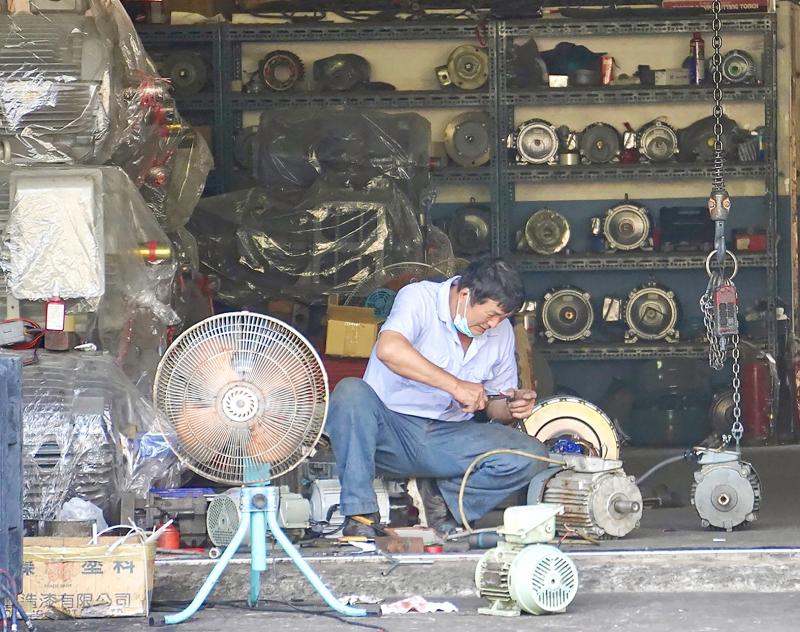The manufacturing industry saw its growth accelerate in January from a stable state in the previous month, with an index gauging the sector’s health at “yellow-red” for the first time since September 2010, the Taiwan Institute of Economic Research (TIER, 台灣經濟研究院) said yesterday.
The think tank attributed the upward trend to a gradual recovery around the world — as an increasing number of countries have launched programs to vaccinate their residents against COVID-19 — and to the booming stay-at-home economy, which has increased demand for electronics.
The manufacturing sector has also benefited as businesses increased inventories prior to the Lunar New Year holiday.

Photo: CNA
Outputs from traditional industries were also robust, thanks to strong consumption and further increasing demand for raw materials, the institution said.
As a result, the composite index for the local manufacturing sector in January rose to 16.79 points — the first “yellow-red” indicator in 10 years — from 13.43 in December last year, TIER data showed.
The institute uses a five-color system to indicate economic activity, with red signaling overheating, yellow-red showing rapid growth, green representing stable growth, yellow-blue sluggish growth and blue reflecting a contraction.
Within manufacturing, economic activity continued strongly — with the indicator at “red” — in the information sector, and the electronic parts and components sector.
“Overall, the domestic manufacturing sector remains set to enjoy optimistic prospects,” the institute said in a news release yesterday.
Looking ahead, the institute said that the COVID-19 pandemic and unstable trade relations between the US and China would continue to challenge the global economy.
Nevertheless, continuous expansion in 5G, high-performance computing and artificial intelligence, increasing demand in the stay-at-home economy and advanced production techniques in the semiconductor sector are expected to foster growth of the electronics and information sectors, the institute added.

Taiwan Transport and Storage Corp (TTS, 台灣通運倉儲) yesterday unveiled its first electric tractor unit — manufactured by Volvo Trucks — in a ceremony in Taipei, and said the unit would soon be used to transport cement produced by Taiwan Cement Corp (TCC, 台灣水泥). Both TTS and TCC belong to TCC International Holdings Ltd (台泥國際集團). With the electric tractor unit, the Taipei-based cement firm would become the first in Taiwan to use electric vehicles to transport construction materials. TTS chairman Koo Kung-yi (辜公怡), Volvo Trucks vice president of sales and marketing Johan Selven, TCC president Roman Cheng (程耀輝) and Taikoo Motors Group

Among the rows of vibrators, rubber torsos and leather harnesses at a Chinese sex toys exhibition in Shanghai this weekend, the beginnings of an artificial intelligence (AI)-driven shift in the industry quietly pulsed. China manufactures about 70 percent of the world’s sex toys, most of it the “hardware” on display at the fair — whether that be technicolor tentacled dildos or hyper-realistic personalized silicone dolls. Yet smart toys have been rising in popularity for some time. Many major European and US brands already offer tech-enhanced products that can enable long-distance love, monitor well-being and even bring people one step closer to

RECORD-BREAKING: TSMC’s net profit last quarter beat market expectations by expanding 8.9% and it was the best first-quarter profit in the chipmaker’s history Taiwan Semiconductor Manufacturing Co (TSMC, 台積電), which counts Nvidia Corp as a key customer, yesterday said that artificial intelligence (AI) server chip revenue is set to more than double this year from last year amid rising demand. The chipmaker expects the growth momentum to continue in the next five years with an annual compound growth rate of 50 percent, TSMC chief executive officer C.C. Wei (魏哲家) told investors yesterday. By 2028, AI chips’ contribution to revenue would climb to about 20 percent from a percentage in the low teens, Wei said. “Almost all the AI innovators are working with TSMC to address the

Malaysia’s leader yesterday announced plans to build a massive semiconductor design park, aiming to boost the Southeast Asian nation’s role in the global chip industry. A prominent player in the semiconductor industry for decades, Malaysia accounts for an estimated 13 percent of global back-end manufacturing, according to German tech giant Bosch. Now it wants to go beyond production and emerge as a chip design powerhouse too, Malaysian Prime Minister Anwar Ibrahim said. “I am pleased to announce the largest IC (integrated circuit) Design Park in Southeast Asia, that will house world-class anchor tenants and collaborate with global companies such as Arm [Holdings PLC],”